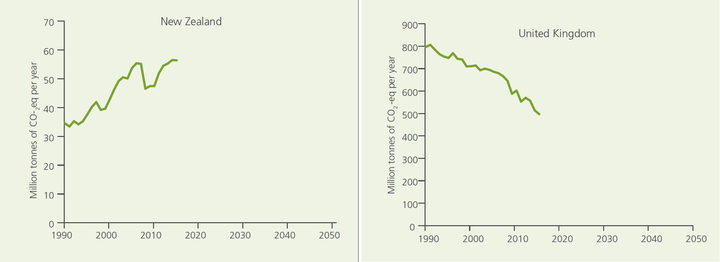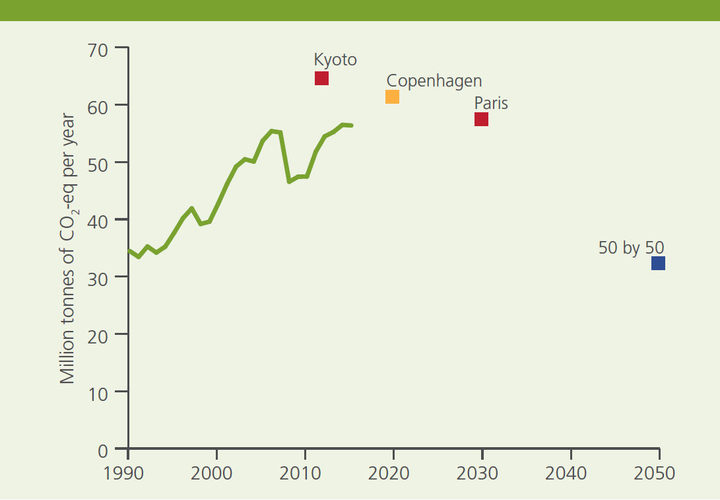 |
| Reviews and Templates for Expression We |
New law for climate targets needed - Commissioner
The environment watchdog is proposing writing emissions reduction targets into law and is urging cross-party political support for the idea.

Parliamentary Commissioner for the Environment Jan Wright Photo: ©Office of the Parliamentary Commissioner for the Environment
In her final report as Parliamentary Commissioner for the Environment, Jan Wright proposes New Zealand follow the lead of the UK, which introduced its Climate Change Act with overwhelming support in the House of Commons in 2008.
Read the full report: Stepping stones to Paris and beyond (PDF 3255kb)
A key feature of the British legislation was to include emissions targets in the legislation and set up a process for reaching them.
Dr Wright, who is stepping down from the position in October, said the UK's greenhouse gas curve had since bent downwards, with net emissions falling 38 percent between 1990 and 2015.
In New Zealand over that time, net emissions rose by 64 percent.

These graphs from the report show the very different trajectories of greenhouse gas emissions in New Zealand and the UK since 1990. Photo: Parliamentary Commissioner for the Environment
At least nine other countries have passed climate change laws similar to the UK's, including Denmark, Finland, France, and Ireland, as have a number of states in the US, Canada, and Australia.
Dr Wright said she wanted climate change, which she called the most serious environmental issue of all, to stop being used as a political football.
"This system they have in the UK doesn't take all the politics out because governments can still make decisions, but it takes a lot of it out," she said.
"And that's what I'm wanting is a process that does that, because we can't allow what we do about climate change to jsut wax and wane with political will.
"It's not fair on our young people, this is their world."
She said putting greenhouse gas targets into law would signal that a commitment to meeting them is a priority, now and into the future.
"Climate change transcends governments and our approach must do the same."

New Zealand’s net emissions of greenhouse gases from 1990 to 2015, showing the Kyoto protocol, Copenhagen Accord, Paris Agreement, and 50 percent by 2050 targets. Photo: PCE / Data from NZ Greenhouse Gas Inventory
Recommendations
Dr Wright's report is critical of a lack of a process to get New Zealand to its climate change reduction target - 11 percent below 1990 levels by 2030 under the Paris Agreement.
She said putting climate change targets into law would make current and future governments accountable for actually reducing emissions.
Other recommendations include:
- A Climate Change Transition Bill including at least one greenhouse gas emissions reduction target and a requirement that it be met
- The Bill introducing a limit on carbon credits purchased from overseas
- Setting up a new body, the Climate Change Commission
- Five-yearly carbon budgets, recommend by the Commission and set by the Climate Change Minister, consistent with climate change targets. This would give businesses more certainty
- Annual, publicly available reports prepared by the Commission on the carbon budgets' process and progress
- Five-yearly risk assessments, prepared by the Commission, detailing the risks posed around New Zealand by climate change
- Requirement for an explanation from the minister if the commission's advice is not followed or carbon budget requirements are not met
- Requirement for the minister to prepare proposals and policies in response to the carbon budgets
How the law operates in the UK
The UK has enshrined in its law that net greenhouse gas emissions must be at least 80 percent lower than net emissions in 1990 by 2050.
However, it has the ability to amend the target if there are significant changes in either scientific knowledge or international law policy.
It also sets five-year carbon budgets, which is the total amount of greenhouse gases that can be emitted over a five year period.
Dr Wright said this provides the country with "stepping stones" to reduce emissions.
Under the Act, the government must come up with plans to keep emissions within carbon budgets. If the country is not on track for meeting a carbon budget, the government must say why not and what it is doing about it.
Dr Wright said the setting of carbon budgets demonstrated a serious intent to reduce emissions.
The first two budgets had been met and the UK is on track to meet its third one for the period of 2018 to 2022.
It also established an expert independent body to advise the government on what level the carbon budgets should be set at, how many international carbon credits could be used to meet the budget, and the extent to which the budget should be met by sectors of the economy.
The body reports annually to the UK Parliament on the progress made in meeting the carbon budget, and the government is required to respond to the reports within a fixed period.
Periodic reports on the impacts of climate change in the UK are also produce and tabled in Parliament, and the law requires the government to develop a programme setting out how it will adapt to the changing climate.
Its most recent, 2017, report examined risks including in coastal flooding, health, water supply, soil, ecology, food production, pests and disease.
|
|
|
|
Copyright remains with the original authors |